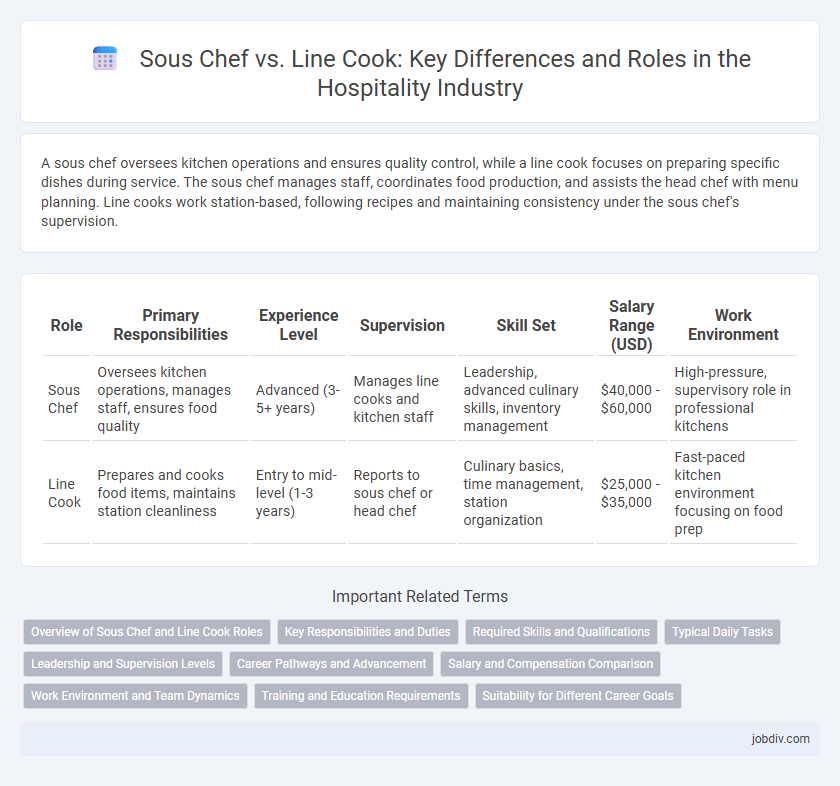A sous chef oversees kitchen operations and ensures quality control, while a line cook focuses on preparing specific dishes during service. The sous chef manages staff, coordinates food production, and assists the head chef with menu planning. Line cooks work station-based, following recipes and maintaining consistency under the sous chef's supervision.
Table of Comparison
| Role | Primary Responsibilities | Experience Level | Supervision | Skill Set | Salary Range (USD) | Work Environment |
|---|---|---|---|---|---|---|
| Sous Chef | Oversees kitchen operations, manages staff, ensures food quality | Advanced (3-5+ years) | Manages line cooks and kitchen staff | Leadership, advanced culinary skills, inventory management | $40,000 - $60,000 | High-pressure, supervisory role in professional kitchens |
| Line Cook | Prepares and cooks food items, maintains station cleanliness | Entry to mid-level (1-3 years) | Reports to sous chef or head chef | Culinary basics, time management, station organization | $25,000 - $35,000 | Fast-paced kitchen environment focusing on food prep |
Overview of Sous Chef and Line Cook Roles
The sous chef acts as the second-in-command in the kitchen, overseeing daily operations, managing staff, and ensuring quality control, while the line cook focuses on preparing specific dishes according to recipes and standards. Sous chefs coordinate with executive chefs, handle inventory, and step in to solve kitchen challenges, whereas line cooks specialize in station-based cooking tasks like grill, saute, or pastry. Both roles require culinary expertise, but sous chefs hold more leadership responsibilities and broader oversight in kitchen management.
Key Responsibilities and Duties
The Sous Chef holds a leadership role responsible for overseeing kitchen operations, managing staff, and ensuring food quality and safety standards are met. The Line Cook focuses on preparing specific dishes, following recipes precisely, and maintaining station cleanliness during service. Both positions require strong culinary skills, but the Sous Chef's duties include inventory management and training, while the Line Cook concentrates on execution and consistency.
Required Skills and Qualifications
Sous chefs require advanced culinary skills, strong leadership abilities, and experience in kitchen management, including menu planning and inventory control. Line cooks need proficiency in specific cooking techniques, speed, and attention to detail to prepare dishes accurately under pressure. Formal culinary training and food safety certifications are essential for both roles, while sous chefs often hold additional supervisory qualifications.
Typical Daily Tasks
A sous chef supervises kitchen operations, managing staff schedules, ensuring food quality, and coordinating with the head chef to execute menu plans. Line cooks specialize in preparing specific dishes or sections, handling tasks such as chopping ingredients, cooking proteins, and plating meals according to standardized recipes. Both roles require strong culinary skills, but the sous chef has broader responsibilities in managing kitchen workflow and quality control.
Leadership and Supervision Levels
The Sous Chef holds a higher leadership role than the Line Cook, responsible for supervising kitchen staff, managing food preparation, and ensuring quality control. Line Cooks focus primarily on executing menu items under the direction of the Sous Chef and Head Chef, with limited supervisory duties. The Sous Chef acts as a key intermediary between management and kitchen staff, overseeing workflow and maintaining kitchen efficiency.
Career Pathways and Advancement
A Sous Chef typically advances from a Line Cook position by gaining expertise in kitchen management, menu planning, and supervisory skills, positioning themselves for higher responsibilities such as Executive Chef roles. Line Cooks focus on mastering specific cooking techniques and station efficiency, building foundational culinary skills crucial for promotion within brigade hierarchy. Career progression in hospitality kitchens depends on experience, leadership ability, and culinary creativity, with Sous Chefs often acting as the bridge between kitchen staff and management.
Salary and Compensation Comparison
Sous chefs typically earn between $45,000 and $65,000 annually, reflecting their higher responsibility in kitchen management and menu development, while line cooks usually make between $28,000 and $38,000 per year, depending on location and experience. Compensation packages for sous chefs often include benefits like health insurance, bonuses, and profit sharing due to their supervisory role, whereas line cooks may receive basic wages with fewer additional perks. Salary progression for sous chefs is faster and more substantial as they prepare to advance to executive chef positions, highlighting the financial incentives tied to career growth in hospitality kitchens.
Work Environment and Team Dynamics
Sous chefs often operate within fast-paced, high-pressure kitchen environments, coordinating closely with chefs de cuisine and managing line cooks to ensure smooth service flow. Line cooks typically concentrate on specific food preparation stations, working under the guidance of sous chefs and maintaining clear communication to uphold consistent quality. Effective team dynamics hinge on the sous chef's leadership skills and the line cook's ability to execute tasks efficiently while adapting to the collaborative kitchen atmosphere.
Training and Education Requirements
Sous chefs typically require formal culinary education combined with extensive professional kitchen experience to master advanced cooking techniques and leadership skills. Line cooks often enter the field with basic culinary training or on-the-job experience, focusing on specific station preparation under the sous chef's guidance. The sous chef role demands proficiency in kitchen management, menu planning, and staff supervision, while line cooks prioritize speed, consistency, and execution of assigned tasks.
Suitability for Different Career Goals
Sous chefs are best suited for individuals aiming to advance into kitchen management and leadership roles, as they oversee operations and mentor line cooks. Line cooks are ideal for those seeking to build foundational culinary skills and specialize in specific cooking stations without immediate leadership responsibilities. Career progression from line cook to sous chef often requires honing technical expertise, time management, and interpersonal skills within a fast-paced kitchen environment.
Sous Chef vs Line Cook Infographic

 jobdiv.com
jobdiv.com